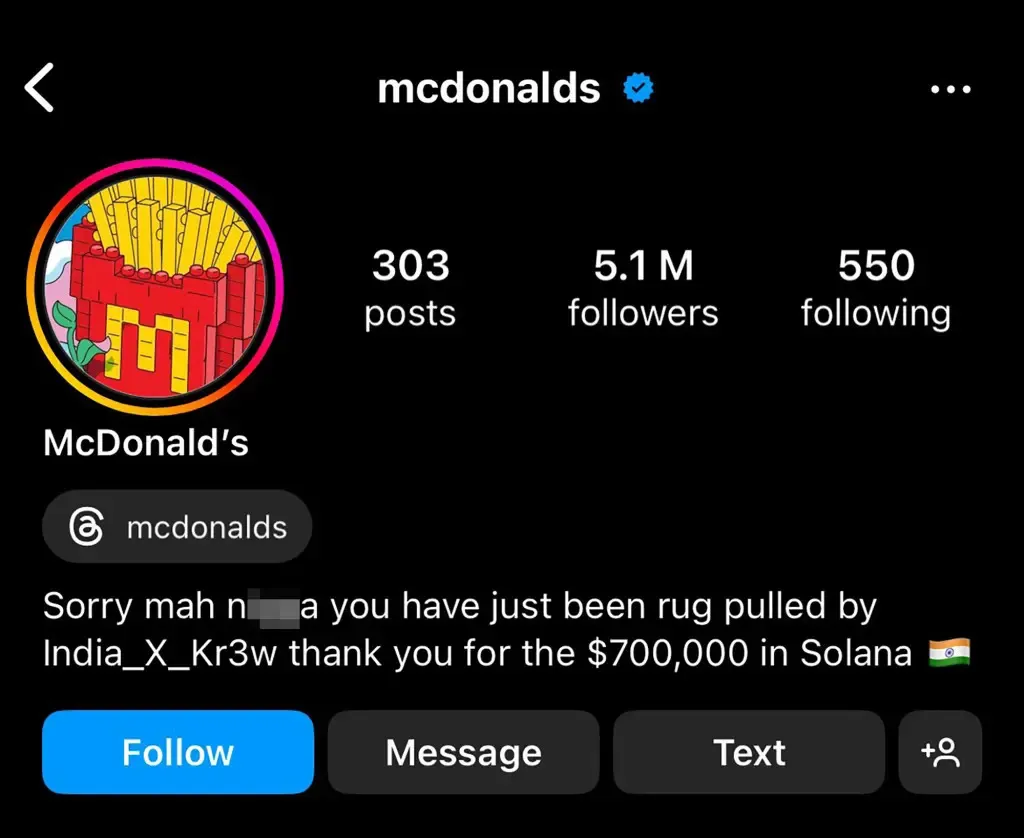
In a shocking cybersecurity breach, hackers claimed to have compromised McDonald’s official Instagram account, using the platform to promote a fraudulent cryptocurrency and successfully siphoning off $700,000 from unsuspecting victims. The breach underscores the ongoing vulnerability of major brands to cyberattacks, especially in the rapidly evolving world of digital currencies.
The incident came to light when a screenshot began circulating online, showing a post on McDonald’s Instagram page that had been altered by the hackers. The caption was changed to read, “Sorry mah n–ga you have just been rug pulled by India_X_Kr3w thank you for the $700,000 in Solana,” accompanied by an emoji depicting the flag of India. The post was visible to McDonald’s 5.1 million Instagram followers, spreading the fraudulent message to a vast audience.

McDonald’s quickly responded to the situation, issuing a statement acknowledging the breach: “We are aware of an isolated incident that impacted our social media accounts earlier on 21st August. We have resolved the issue on those accounts and apologize to our fans for any offensive language posted during that time.” The fast food giant moved swiftly to regain control of its social media accounts and remove the offensive content.
The hackers reportedly used the compromised account to promote a fake meme coin named "GRIMACE," hosted on the Solana blockchain, a platform known for its high-performance capabilities in supporting decentralized cryptocurrencies. Within a mere 30 minutes, the fraudulent token skyrocketed from zero to $25 million in value, drawing in unsuspecting investors who hoped to capitalize on the new digital asset. However, as is typical in a “Crypto Rug Pull” scam, the value of the token plummeted to zero once the hackers withdrew the amassed liquidity, leaving investors with worthless tokens.
The term “rug pull” refers to a common scam in the cryptocurrency world, where creators of a fake digital asset build hype around the coin, attract investment, and then disappear with the funds, leaving investors with nothing. This particular incident highlights the dangers of relying on social media endorsements and the need for heightened vigilance when dealing with emerging digital assets.
Adding to the severity of the breach, Guillaume Huin, a senior marketing director at McDonald’s, also had his social media accounts compromised. Posts from his accounts promoted the fake cryptocurrency, with one post misleadingly referring to the scam as “a McDonald’s experiment on Solana.” These posts were later deleted after McDonald’s regained control.
This breach serves as a stark reminder of the risks associated with the burgeoning cryptocurrency market, as the recent WazirX hacking incident is a prominent example, particularly highlighting the susceptibility of even the most reputable brands to cyberattacks that can have significant financial and reputational repercussions.
The "McDonald's Crypto Wojak" has become a viral meme symbolizing the despair and frustration experienced by cryptocurrency traders during market crashes. Featuring the iconic Wojak character, often depicted wearing a McDonald's uniform, this meme reflects the harsh reality many traders face when their investments plummet, forcing them to return to regular jobs.
Also Read:- Monetize Your Blog TapSwap: Why it is Trending

1 month ago
News on crypto lending
1 month ago
Environmental impact of crypto
1 month ago
Cryptocurrency trading news
1 month ago
Crypto investment news
1 month ago
Cryptocurrency market updates
1 month ago
Cryptocurrency tax news
1 month ago
Blockchain integration in business
1 month ago
DeFi news updates
1 month ago
Top crypto influencers
1 month ago
Blockchain technology news